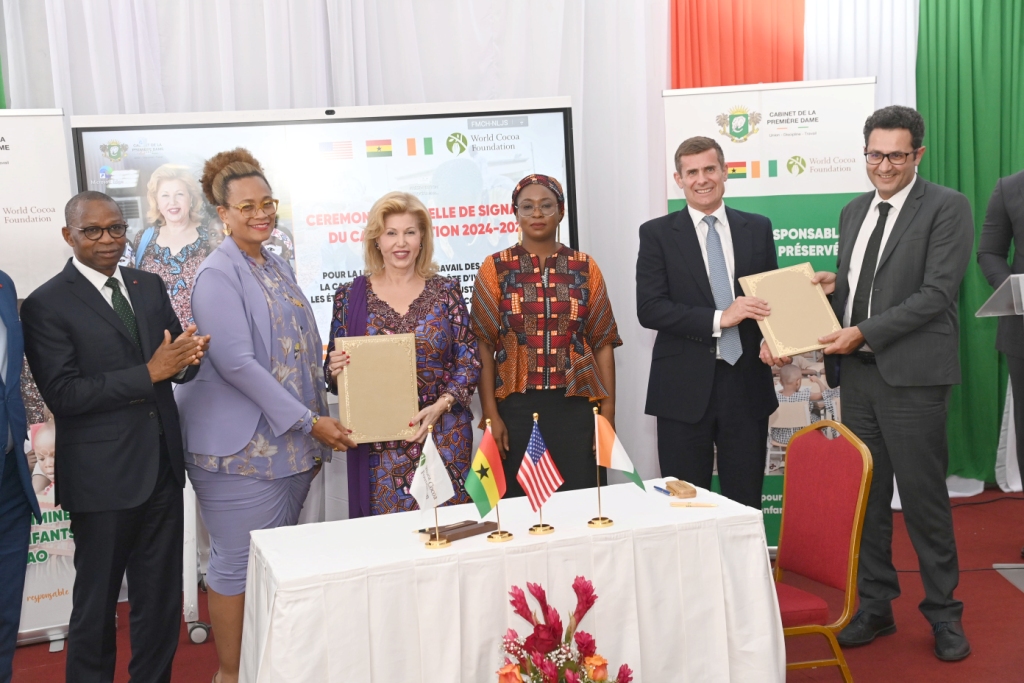The fight against child labor : Côte d’Ivoire, Ghana, the United States of America and the cocoa and chocolate industry reach a new milestone

The First Lady, Mrs Dominique Ouattara, presided over a ceremony of great importance, this Wednesday, November 27, 2024. The official signing ceremony of the 2024-2029 Framework for Action between Côte d’Ivoire, Ghana, the United States of America and the international cocoa and chocolate industry to combat child labor in cocoa farming took place at her office in Cocody. This agreement marks a significant step forward in the eradication of this phenomenon in the cocoa production chain.
The First Lady welcomed the presence of representatives from Côte d’Ivoire, Ghana and the United States, as well as technical and financial partners and cocoa manufacturers, who lent a special sparkle to the event. She expressed her satisfaction at the signing of this new framework for action, which she sees as a major step forward and a decisive milestone in the fight against child labor in the cocoa production chain. Indeed, for the First Lady, this new framework for action marks an important step to better structure collective efforts to combat child labor in cocoa production in Côte d’Ivoire and Ghana. “(…) This framework for action, which clarifies the context and defines the guidelines for our collaboration, will enable us to respond more effectively to the persistent challenge of eliminating child labor in the cocoa supply chain in our two countries”, stated the President of the National Oversight Committee for Actions to Combat Child Trafficking, Exploitation and Labor (CNS). This new agreement, which follows on from the one signed in 2010, opens up new prospects for a stronger collective commitment against child labor. “To all these children and adolescents, we want to say that we will not get rid of them. We intend to honor our commitment to each and every one of them, to protect them from trafficking, exploitation and child labor,” promised Mrs Dominique Ouattara. With a view to fully fulfilling this promise, the First Lady highlighted a series of measures that will enable stakeholders to better combat this phenomenon. She mentionned the strengthening and expansion of public and private child labor monitoring systems, as well as cocoa traceability systems, to identify, prevent and remedy child labor. Strengthening access to quality education and vocational training for all children, with particular attention to the specific needs of girls, through the construction of classrooms, school canteens, housing for teachers, bridging classes to give out-of-school children a chance to go to school, and several other measures. These measures are all the more important for Mrs Dominique Ouattara, as they will enable a more effective response to child labor. “Our aim is also to meet the requirements of economic, social and environmental sustainability of the cocoa supply chain, to support a successful cocoa economy in Côte d’Ivoire and Ghana”, said the First Lady. However, despite this commitment, the First Lady remains aware that the task will not be easy, especially given the many external factors, such as the strong migration of vulnerable populations fleeing terrorist threat in their countries of origin. This is why she was keen to sound the alarm and call for urgent action to counter the expansion and spread of child labor. “This massive population movement carries the risk of increasing the number of children exposed to child labor in cocoa production. This is why we must act urgently and with greater determination and to counter the expansion and spread of child labor in cocoa-producing areas”, recommended Mrs Dominique Ouattara. In conclusion, the wife of the Head of State made a solemn appeal to all players in the cocoa value chain to join her in the fight against child labor. For her, the well-being and fulfillment of children lies in everyone’s responsibility to make the right decisions for their future. “I remain convinced that it is only by working together that we will succeed in eradicating child labor in the cocoa production chain in sustainable way”, she concluded.
Mr. Adama Kamara, Minister of Employment and Social Protection, Chairman of the Interministerial Committee for the Fight against Child Trafficking, Exploitation and Labor (CIM), paid tribute to the First Lady’s leadership in the fight against child labor. He maintained that the efforts and progress made by the country in the fight against this phenomenon had been possible thanks to her commitment over many years.
Mr. Ibrahim Daouda, representative of Ghana’s Ministry of Employment and Labor Relations, recalled the partnership between his country and Côte d’Ivoire in the fight against child labor in cocoa farming. He maintained that cocoa farming must never become a ground for exploiting child labor. He also stressed the importance of the two countries pooling their efforts to eradicate this phenomenon.
Jessica Ba Davis, Ambassador of the United States of America to Côte d’Ivoire and spokeswoman for USDOL (the US government’s Department of Labor), reiterated the US government’s determination to stand by both countries in this fight. To this end, she announced an additional US$1 million to support projects underway in Ghana and Côte d’Ivoire to eradicate child labor.
For Chris Vincent, President of the World Cocoa Foundation (WCF), this initiative is undeniably part of a collective commitment to eliminate child labor.
Ms. Ndeye Coumba Diop, Director of the ILO Country Office in Côte d’Ivoire, speaking on behalf of the agencies of the United Nations and the technical and financial partners, said that this new framework for action was an important milestone in renewing the commitments of the various players involved in the fight against child labor.
Mathias Lange, Executive Director of the International Cocoa Initiative (ICI) Foundation, presented the new framework for action.
With this renewed commitment, Côte d’Ivoire once again reaffirms its leadership and determination to build a fairer cocoa industry that respects children’s rights.